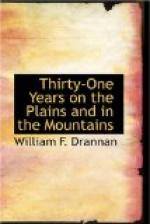I did not see any Indians of any account until the command to fire was given. When the soldiers commenced to fire—there being about twelve hundred—it frightened the Indians so that they came running out from under those logs and brush like jack rabbits and were shot down like sheep. In all my experience in the Western wilds I never saw such a slaughtering as there.
The Indians had been taught by the Mormons that if they would fortify themselves in that way the whites could not harm them, teaching them also, that the Lord would protect them, which was a great thing for the white people, for it came so near cleaning the Utes up that there was only a little remnant left, and they never gave the white people any more trouble. Thus white people were enabled to pass through that country unmolested. Heretofore it had been one of the most dangerous parts of the country. For all this I have ever since believed that the Mormons, unintentionally, did the Gentiles a great favor.
After the battle was over, and as scouts are at liberty to go where they please, I rode over the battle-field in company with the other scouts and I never in all my life saw such a mangled up mass as was there. Men, women and children were actually lying in heaps, and I think all that got away were a few that hid among the logs and brush.
I n this battle the Captain told me they did not lose a man, and had only four wounded, while he counted over three thousand dead Indians.
When I returned to Salt Lake City I was astonished to see the manner in which the Salt Lake papers abused Gen. Connor for slaughtering the Indians in the manner he had, when they (the Mormons) had planned the slaughter, although not meaning for it to be a slaughter of Indians.
Gen. Connor said that the Mormons had thought that the Indians would fortify themselves, and when attacked by the soldiers, they would wipe them (the soldiers) off the face of the earth. The idea had been so thoroughly instilled into the minds of the Indians by the Mormons that the Lord would protect them if only fortified in this manner that they depended most altogether on the Lord to protect them.
The third day on our return trip we came to a little place called Ogden. Here the General made preparations to leave the command and go ahead, accompanied by one company, of cavalry. When they were ready I was directed to accompany him, which I did. He and I rode in the rear of the company. After riding some little distance Gen. Connor said: “Drannan, I think I can put you on the track of a good thing if it would suit you.” I asked him in what way. He asked me if I had not heard of the Mountain Meadow massacre in Utah. I said: “Certainly, many times.” He said: “Now be honest with me and tell me who you think did that horrible work.” I told him the Mormons, and the Mormons alone.
He then told me there was a man at the fort from Chicago trying to work up the case and if possible to find out just by whose authority the Mormons had massacred those emigrants, and he said: “From what I have seen of you, I think you would be just the man to help him work up the case.”




